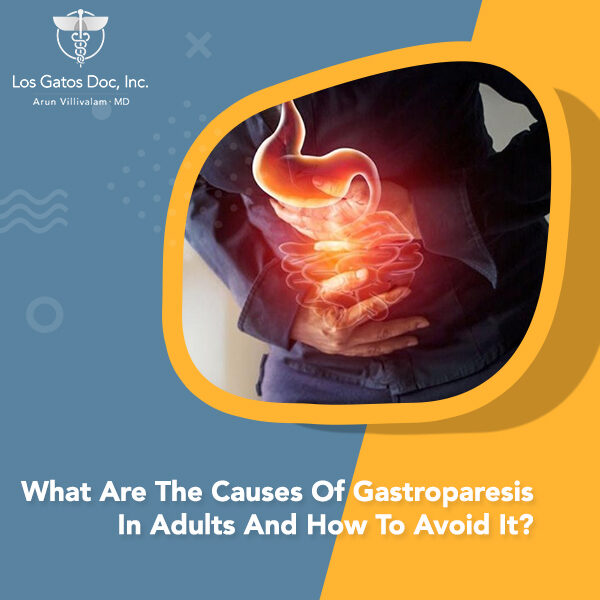Gastroparesis affects the normal movement of your stomach muscles, which causes it to either slow down or not work at all. This condition prevents your stomach from moving the food through your digestive tract and emptying efficiently.
Gastroparesis can cause issues such as improper digestion, nausea, vomiting, stomach pain, and affect your overall health.
Gastroparesis is not a common condition. Out of 100,000 people, around 10 men and 40 women have it.
However, gastroparesis-like symptoms are common and occur in 1 out of 4 adults in the United States.
Gastroparesis can cause serious complications if left untreated. Learn more about gastroparesis, its symptoms and causes in this article. Also, find out what treatments work best for gastroparesis.
What Is Gastroparesis?
Gastroparesis is a stomach disorder of delayed gastric emptying or the inability to move food along the digestive tract.
Gastroparesis, also known as gastric stasis, delays or prevents the movement of food from your stomach to your small intestine, even when there is no blockage in the stomach or intestines.
In the normal digestion process, your stomach muscles grind the food into smaller bits, tighten and push the food through your digestive tract into the small intestine.
But when you have gastroparesis, your stomach muscles slow down or may not function at all. The food takes a long time to leave your stomach and your stomach will not empty the contents properly.
What Are The Complications Of Gastroparesis?
Gastroparesis can delay digestion, which can lead to further complications and even serious health conditions.
Some of the complications are:
- Severe thirst or dehydration because of frequent vomiting
- Malnutrition because of the poor absorption of nutrients
- Unintended weight loss
- Bezoars, which is the undigested, hardened food that remains in your stomach. It can be fatal if they prevent food from passing into your small intestine.
- Erratic blood sugar changes
- Decreased quality of life
Are You At Risk For Gastroparesis?
You are more likely to get gastroparesis if you meet the following conditions:
- Infection
- Diabetes
- Scleroderma
- Hypothyroidism
- Small bowel resection
- Nervous system diseases
- Certain medications
- Certain cancer treatments
- Abdominal or esophageal surgery
What Are The Common Gastroparesis Symptoms?
Gastroparesis symptoms vary based on the cause of the condition. However, there are some common symptoms which include:
- Feeling full after eating only a few bites of food.
- Nausea
- Vomiting
- Bloating
- Belching
- Heartburn
- Stomach discomfort and pain
- Changes in blood sugar levels
- Poor appetite, weight loss and malnutrition
If you notice any of these symptoms, you should talk with your doctor to get a formal diagnosis so you can manage your gastro-intestinal symptoms, caused by gastroparesis or otherwise, and prevent it from worsening.
What Are The Causes of Gastroparesis?
Gastroparesis can be because of an injury to the stomach, small intestine or vagus nerve that controls your stomach and small intestine muscles. The vagus nerve handles several complex processes, including signaling the muscles in your stomach to tighten and propel the food into your small intestine. When the vagus nerve is injured, it cannot send the signals properly to the stomach muscles, thus hampering the normal digestion process. Certain health conditions can also damage the vagus nerve, such as diabetes.
In general, the following conditions may cause gastroparesis:
- Injury
- Surgery
- Diabetes
- High blood sugar
- Pregnancy
- Hypothyroidism
- Stomach infections
- Certain autoimmune diseases
- Certain nervous system disorders
- Certain medications such as opioid pain relievers, antidepressants, high blood pressure and allergy medications
When the doctors cannot identify the underlying cause of your gastroparesis, even with medical tests, it is called idiopathic gastroparesis.
What Is The Best Treatment For Gastroparesis?
Although there’s no cure for gastroparesis, you can make certain changes that can offer some relief.
Here are our top suggestions for treatment if you have gastroparesis.
Dietary And Lifestyle Changes: If you have been diagnosed with gastroparesis, you will need to follow a special diet which provides the right amount of nutrients, calories, and is low in fat and fiber. Following a restrictive diet can lead to malnourishment and dehydration and therefore it’s strongly recommended that you work with your doctor to come up with a diet plan. This includes eating soft, well-cooked meals and chewing it well, having five or six small meals often throughout the day, drinking 6-10 cups of water daily, and avoiding foods that cause bloating or discomfort.
If you have moderate-to-severe gastroparesis, your doctor might prescribe pureed or blended food, or a liquid diet including soups and liquids containing glucose and electrolytes. Incorporate regular exercise and avoid caffeine, alcohol, carbonated beverages, and tobacco. Avoid raw fruits and vegetables and eat them well-cooked.
It’s also preferable to avoid fibrous fruits and vegetables like oranges and broccoli because of the possibility of bezoars.
Depending on the severity of your condition, you may also be asked to take a multivitamin daily.
You should aim to keep your blood sugar levels as close as possible to the target range.
Medication: Inform your doctor about all the current medications you are taking. Some of them may cause your digestion problems, including making your gastroparesis symptoms worse.
The medications usually used to treat gastroparesis include:
– Drugs that stimulate the muscles of the stomach such as metoclopramide and erythromycin .
– Drugs that control nausea and vomiting such as benadryl.
Talk to your doctor about the best gastroparesis treatment plan for you. They may recommend medication that helps control the common symptoms such as nausea, vomiting and pain.
Surgical procedures: The typical surgical procedures for gastroparesis include gastric electrical stimulation (GES), vagal nerve stimulation (VNS), and pyloroplasty (a procedure to open up the pyloric sphincter, the valve at the top of the stomach). However, these are reserved for only a few cases and you may not need them if you diagnose and change your lifestyle.
Conclusion
Gastroparesis is not a common condition, and it has no cure. However, it can be managed with changes to your diet and lifestyle, along with medication. In a few cases, we also recommend surgery.
If you are suffering from gastro-intestinal issues, we recommend scheduling an appointment with your primary care physician who can then provide you with a correct diagnosis and provide solutions.
(Disclaimer: We routinely draw upon public health resources to inform our write-ups. Information in this article may be drawn up from multiple public health sources, including:
- Centers for Disease Control & Prevention
- Medline Plus
- National Institutes of Health
- American Medical Association
- American Association of Family Physicians
- Mayo Clinic
- Family Doctor






